NI hospital waiting lists 'undermining' free health service
- Published
- comments
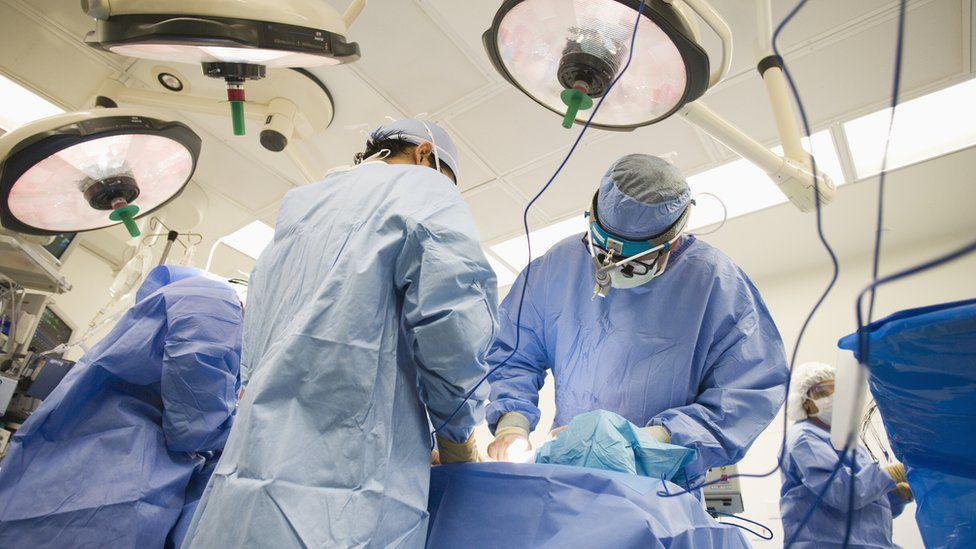
The size of Northern Ireland's hospital waiting lists is "undermining" the principle of a free health service, Health Minister Robin Swann has said.
Figures published on Thursday showed more than 335,000 people are waiting for a first consultant-led appointment.
More than half of those people - 189,753 - have been waiting longer than a year.
In a statement to BBC News NI, Mr Swann said a new framework was being finalised to tackle waiting lists.
There were difficult choices to be made by all Stormont departments if tackling waiting lists was to be prioritised, he said.
'Innovation and determination'
"We have to reshape services to improve our health service's capacity and ensure this backlog never occurs again," he said.
"The innovation, determination and togetherness that we have seen during the pandemic will all be essential.
"However, it should also be remembered that we tackled Covid with unprecedented levels of emergency funding at our disposal.
"We do not have that for waiting times."

Hospital waiting lists in Northern Ireland are the worst in the UK
Meanwhile, private and independent health clinics in Northern Ireland have told the BBC their contracts with the Department of Health have not been renewed.
The independent sector supports the health service by providing things like theatre capacity, surgical teams and diagnostic testing.
In the year from 1 April 2020 to 4 April 2021, the department said about 5,200 procedures were undertaken by trust consultants in independent sector facilities, when they helped provide time-critical and cancer surgeries during the pandemic.
More people joining lists
The latest figures from the Department of Health show that the number of people on waiting lists for longer than a year is up more than 20,000 compared with the end of December 2020 (167,806).
This was more than 70,000 higher than March 2020, when 117,066 people had been waiting for a year.
On top of those figures, another 12,476 people were waiting for a first appointment for cataract treatment at a day procedure centre.
The departmental target is that at least half of all patients should wait no longer than nine weeks for a first appointment and no-one should wait longer than 52 weeks.
In the past three months, 11,868 people have joined the waiting lists.
More people were seen for the first time in the three months to March 2021 (71,078) than in the quarter ending December 2020 (66,055).
But that was 34,190 fewer than in the quarter ending March 2020, when 105,268 people had their first appointment.
Worst in the UK
Mr Swann has said ministers owe it to health and care professionals to sort out the crisis after staff had made "enormous efforts to minimise the impact of the pandemic on patients".
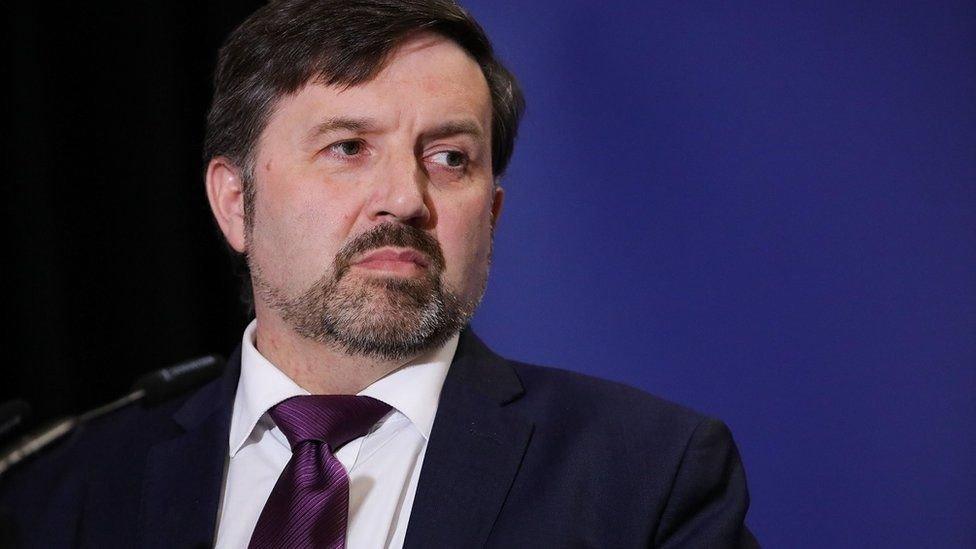
Robin Swann says hospital waiting lists are undermining the health service
This week there has been a major focus on Northern Ireland waiting lists, which are the worst in the UK.
On Wednesday, the Royal College of Surgeons (RCS) published a 10-point action plan on how to tackle the waiting lists.
The college has said that a regional approach involving patient and surgical teams travelling to surgical hubs is the key to progress.
From the start of the pandemic, almost all elective surgery was cancelled in Northern Ireland as wards were closed and nurses moved to work solely in Covid-19 areas.
'Under real strain'
Mark Dayan, from the independent health think tank the Nuffield Trust, said the waiting lists crisis had "spiralled" over the past decade.
"Northern Ireland never fully succeeded in driving waiting times down as much as other places in the UK when progress was being made in the noughties," he said.

One solution may be to build up general practice, the Nuffield Trust says
Mr Dayan highlighted that the system had to "become better at treating people at home, keeping them well and therefore stopping them needing to come to hospital".
"That would be about building up general practice, which is under real strain," he said.
Another problem was that health services in Northern Ireland are "split across too many different locations".
"Northern Ireland has more hospitals than a comparable region in England, which may sound good but the reality is that it splits out the staff and the machinery across different sites and is not best for efficiency or safety," said Mr Dayan.

The Nuffield Trust has a seven-point plan to address waiting lists - it involves:
Developing a realistic 10-year strategy with targets and timelines, made public with named individuals responsible for its the delivery to ensure accountability and transparency
Increasing the use of private hospitals across the UK and the Republic of Ireland in the short term
Focusing on ensuring the right patients are being put on the list and prioritised - not those who could be treated in the community
A long-term workforce plan with international recruitment as an immediate source of staff
Using data to identify bottlenecks in the system and focus resources on addressing them
Quickly beginning plans for "elective care centres" to concentrate staff on single sites where they can work more efficiently
Placing planned care on different sites to emergency care so that beds are not taken up by surges at A&E

'Inequalities are increasing'
Deputy First Minister Michelle O'Neill said the same effort must be applied to tackling health service waiting lists as was used against Covid-19.
She said waiting lists were discussed at Thursday's meeting of the Stormont Executive.
"That's something that needs to be fixed and it's going to require a concerted effort," she told media in Coalisland, County Tyrone.
"I have asked for a dedicated discussion at the executive around what is the plan, what are the targets and how can we work together to achieve that, to deliver that and actually get a better health service working for all of the public."

Cara Hunter says tough decisions must be made by politicians
SDLP health spokesperson Cara Hunter said there had been "systemic underfunding" of the health service for decades.
"Tough decisions must be made and certainly it would be our priority to make sure there are patient-focused and person-centred services that are fit for purpose," she added.
Alliance MLA and health committee member Paula Bradshaw said MLAs "absolutely do care" about waiting lists.
She said she would support calls from the health minister for extra funding from the executive.
DUP MLA Jonathan Buckley said dealing with waiting lists was the "primary concern" for politicians.
"Our system is disjointed," he said.
"It needs to come together and there needs to be adequate funding, alongside the reforms that have been proposed."
Related topics
- Published19 May 2021
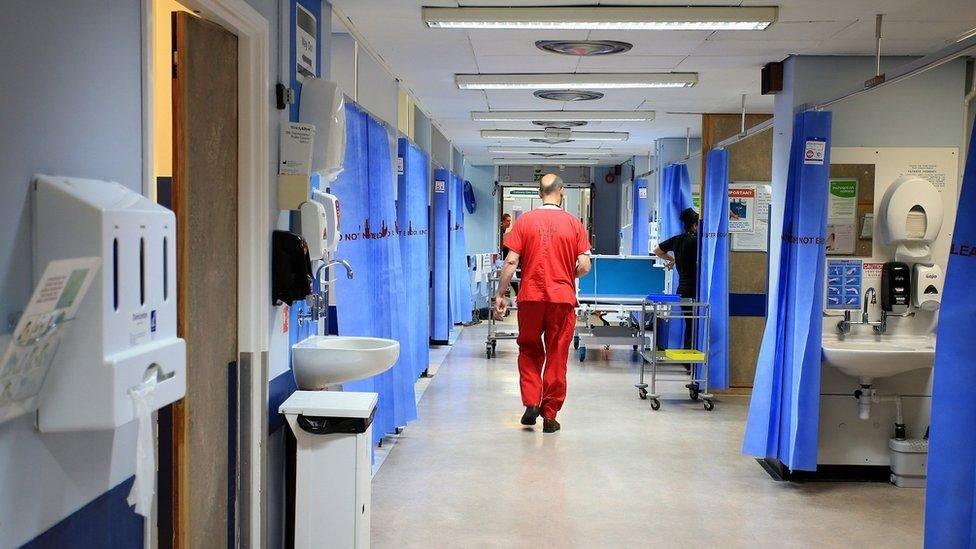
- Published16 March 2021
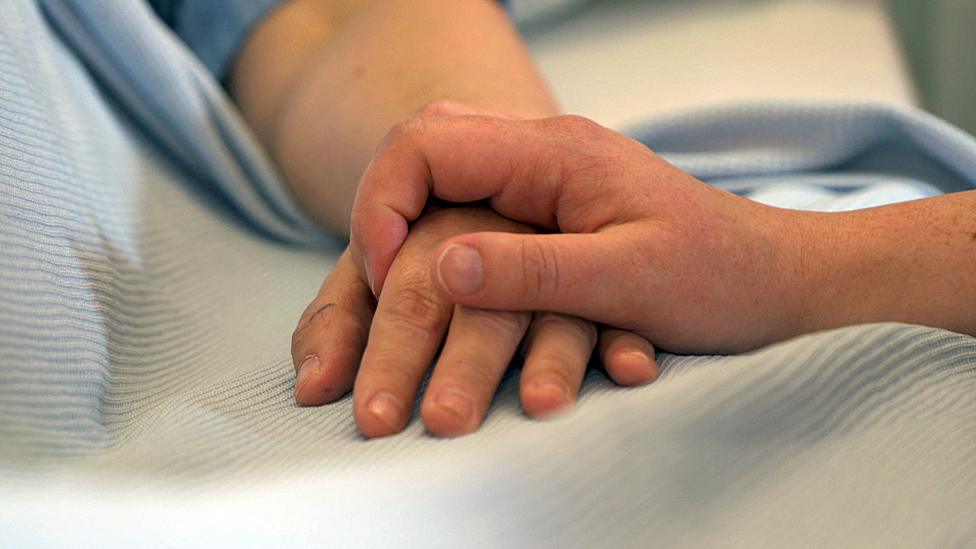
- Published28 January 2021
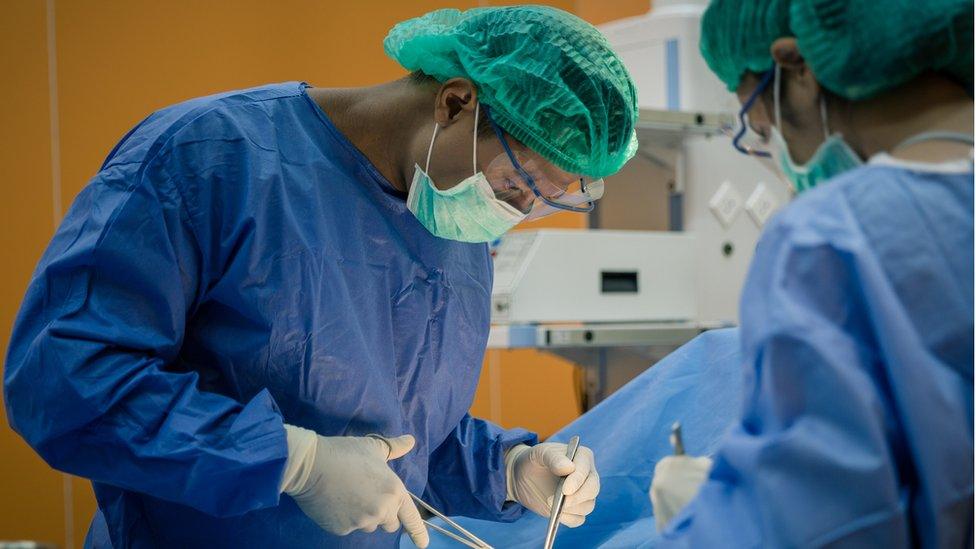
- Published25 May 2021
